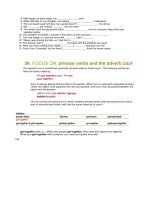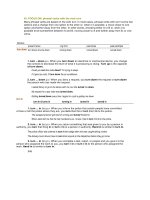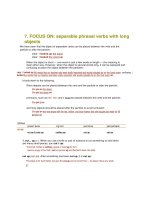phrasal verbs with the verb turn
Bạn đang xem bản rút gọn của tài liệu. Xem và tải ngay bản đầy đủ của tài liệu tại đây (121.41 KB, 16 trang )
45. FOCUS ON: phrasal verbs with the verb turn
Many phrasal verbs are based on the verb turn. In most cases, phrasal verbs with turn involve two
options and a change from one option to the other or, when it is possible, a move closer to one
option and farther away from the other. In other words, choosing either A or B or, when it is
possible to be somewhere between A and B, moving closer to A and farther away from B, or vice
versa.
Infinitive
present tense -ing form past tense past participle
turn down
turn down & turns down turning down turned down turned down
1. turn ...down p.v. When you turn down an electrical or mechanical device, you change
the controls to decrease the level of what it is producing or doing. Turn up is the opposite
of turn down.
Could you turn the radio down? I'm trying to sleep.
If it gets too cold, I'll turn down the air conditioner.
2. turn ... down p.v. When you deny a request, you turn down the request or turn down
the person who has made the request.
l asked Nancy to go to the dance with me, but she turned me down.
My request for a pay raise was turned down.
Getting turned down every time I apply for a job is getting me down.
turn in
turn in & turns in turning in turned in turned in
1. turn ... in (to) p.v. When you inform the police that certain people have committed
crimes or tell the police where they are, you turn them in or turn them in to the police.
The escaped prisoner got tired of running and turned himself in.
When Jake told me that he had murdered Luis, I knew I had to turn him in to the police.
2. turn ... in (to) p.v. When you return something that was given to you by a person in
authority, you turn that thing in or turn it in to a person in authority. Hand in is similar to turn in.
The police officer was ordered to turn in her badge after she was caught taking a bribe.
The delivery truck drivers have to turn their keys in to the dispatcher before they go home.
3. turn ... in (to) p.v. When you complete a test, report, or project and you give it to the
person who assigned the work to you, you turn it in or turn it in to the person who assigned the
work. Hand in is similar to turn in.
348
Melan'ie asked her teacher if she could turn her project in late.
I have to finish this report and turn it in to the sales manager by tomorrow.
4. turn in p.v. When you go to bed, you turn in.
I'm really tired; I'm going to turn in early.
It's getting late; I'm turning in.
Infinitive
present tense -ing form past tense past participle
turn into
turn into & turns into turning into turned into turned into
1. turn into p.v. When something turns into something else, it becomes that thing.
It was cold and rainy this morning, but it turned into a nice day.
It's amazing that this small seed can turn into a huge tree.
2. turn ...into p.v. When you turn something into something else, you change it into that
thing.
The Youngs are thinking of turning their house in the country into a hotel.
The children turned the big box into a playhouse.
turn off
turn off & turns off turning off turned off turned off
1. turn ... off p.v. When you turn off an electrical or mechanical device, you change the
controls to stop it from producing or doing something. Turn on is the opposite of turn off.
Switch off and shut off are similar to turn off.
Would you turn the light off? I want to go to bed.
When I'm driving and have to wait for a long freight train to pass, I always turn my car off.
turned off part.adj. After you have changed the controls of an electrical or mechanical
device to stop it from producing or doing something, it is turned off. Turned on is the
opposite of turned off. Switched off and shut off are similar to turned off.
l can't see anything — the lights are turned off.
2. turn ... off p.v. [informal] Something that turns you off offends you and causes you to
lose interest in something or someone. Something about a person of the opposite sex that
turns you off causes you to lose sexual or romantic interest in that person. Turn on is the
opposite of turn off.
When I met Dan I thought he was a nice guy, but his racist comments turned me off.
I got turned off when she lit a cigarette.
turned off part.adj. When something about a person of the opposite sex causes you to lose
sexual or romantic interest in that person, you are turned off. Turned on is the opposite of
turned off.
What's wrong with Nicole? She was having a good time with Frank a little while ago, but now she seems kind of turned
off.
349
turnoff n. Something that offends you and causes you to lose interest in something or
someone is a turnoff. Something about a person of the opposite sex that causes you to
lose sexual or romantic interest in that person is a turnoff. A turn-on is the opposite of a
turnoff.
l don't like tattoos. To me they're a real turnoff.
3. turn off p.v. When you turn off a road or path that you are traveling on, you leave it and
start to travel on another road or path. When a road or path leaves another road or path
and travels in a different direction, it turns off,
Be careful you don't turn off the main road — you'll get lost.
The path to the cabin turns off just after the big tree stump.
turnoff n. A road or path that leaves another road or path and travels in a different
direction is a turnoff.
We're lost — I think we should have taken that turnoff we passed a few miles back.
Infinitive
present tense -ing form past tense past participle
turn on
turn on & turns on turning on turned on turned on
1. turn ... on p.v. When you turn on an electrical or mechanical device, you change the
controls to make it start producing or doing something. Turn off is the opposite of turn
on. Switch on is the same as turn on.
Can you turn the light on please? It's dark in here.
This October has been so warm that I haven't turned the heat on once yet.
turned on part.adj. After you have changed the controls of an electrical or mechanical
device to make it start producing or doing something, it is turned on. Turned off is the
opposite of turned on. Switched on is similar to turned on.
Be careful of the stove — it's turned on.
2. turn ... on p.v. [informal] Something that turns you on pleases you and causes you to
gain interest in something or someone. Something about a person of the opposite sex
that turns you on causes you to become sexually or romantically interested in that erson.
Turn off is the opposite of turn on.
When I saw this house from the outside, I didn't think I would buy it, but the beautiful woodwork inside really
turned me on.
Erik's blue eyes turn on his wife.
turned on part.adj. When something about a person of the opposite sex causes you to
become sexually or romantically interested in that person, you are turned on. Turned off
is the opposite of turned on.
Paul was really turned on after seeing all the beautiful women in the Victoria's Secret catalog.
350
turn-on n. Something that pleases you and causes you to gain interest in something or
someone is a turn-on. Something about a person of the opposite sex that causes you to
become sexually or romantically interested in that person is a turn-on. A turnoff is the opposite
of a turn-on.
l bought my wife an ankle bracelet for Valentines Day; I think they're a turn-on.
3. turn on p.v. When people or animals that you had good relations with turn on you, they stop
being friendly and try to hurt you.
Lydia used to be my friend, but now she's telling people terrible things about me.
I wonder why she turned on me like that?
Wild animals don't make good pets. They can be friendly one minute and turn on you the next.
4. turn... on (to) p.v. [informal] When you turn people on to something, you tell them about
something you think they will like or something that will help them.
Maria turned me on to a great Colombian restaurant.
This was a good book. Thanks for turning me on to it.
Infinitive
present tense -ing form past tense past participle
turn out
turn out & turns out turning out turned out turned out
1. turn out p.v. [usually followed by "to be" plus an adjective, an infinitive verb plus a noun, or a complete sentence]
When things or people turn out to be a certain way, it is discovered or considered that they are that way. When
things or people turn out to be something, it is discovered or considered that they are that thing. When you say that
it turns out (that) or turned out (that) and then make a statement of fact, you mean that this information, which is
contrary to what you believed or expected, was discovered to be true.
l didn't think I would like my brother's new wife, but she turned out to be very nice.
Before I met Rusty's son, Danny, I assumed he had red hair like his father, but Danny turned out to
have black hair.
I thought Sam bought a Mercedes-Benz, but it turns out that he bought a BMW.
I thought Sam bought a Mercedes-Benz, but it turned out that he bought a BMW.
2. turn out p.v. When something turns out, it becomes what you want it to become. When
something turns out a certain way, it becomes that way.
Did the pictures you took at the wedding turn out?
The pictures turned out perfectly.
Your plan was excellent, but it didn't turn out well.
3. turn... out p.v. When people, companies, factories, workshops, and so on, turn out
something, they manufacture it or produce it.
This new factory will turn out 50,000 units per year.
High schools in America are turning out people who can barely read.
351
4. turn out (for) p.v. When people turn out or turn out for an event, they attend or
participate in the event. When people turn out to do something, they go to a place to do
it.
Are you nuts? How many people do you think would turn out for an outdoor concert In the middle of winter?
Thousands of people turned out to see the Pope when he visited.
turnout n. The number of people who attend or participate in an event is the
turnout.
Voter turnout for the election was only around 30 percent.
Infinitive
present tense -ing form past tense past participle
turn over
turn over & turns over turning over turned over turned over
1. turn ... over p.v. When you turn something over, you move it so that the side that was
on the bottom is on the top, and vice versa. When something turns over, it moves so that
the side that was on the bottom is on the top, and vice versa.
When one side of the steak is cooked, turn it over and cook the other side.
The driver was killed when his car turned over.
2. turn ... over (to) p.v. When you give something to someone because that person
demands or requires it or because you are not its rightful owner, you turn it over or turn it
over to that person. Hand over is similar to turn over.
The detective always turns the evidence from the crime scene over to the lab for analysis.
After the thieves are captured, the stolen items will be turned over to the rightful owners.
3. turn ... over (to) p.v. When the police or other authorities are looking for people and
you take these people or transfer control of them to the police or authorities, you turn
them over or turn them over to the police or authorities.
l caught a burglar in my basement, and I turned him over to the police.
The local police chief was relieved to turn the terrorist over to the FBI.
4. turn over p.v. When employees of a company leave their jobs and are replaced by new
employees, they turn over.
Conditions at the factory were so bad that employees turned over at a high rate. We have a very stable
work force in our plant. Employees turn over very slowly.
turnover n. The rate at which employees of a company leave and are replaced by new
employees is the turnover.
The new personnel manager said her top priority would be reducing the high turnover.
352
5. turn over p.v. When a business turns over something that it sells, it continually sells it
and replaces it with new merchandise.
We're turning over forty cases of bananas a week in this supermarket.
Snowtnobiles and skis turn over very slowly in the summer.
turnover n. How much money a business has made in a certain time period is its
turnover.
The company's annual turnover increased by 36 percent compared to the previous year.
Infinitive
present tense -ing form past tense past participle
turn up
turn up & turns up turning up turned up turned up
1. turn ...up p.v. When you turn up an electrical or mechanical device, you change the
controls to increase the level of what it is producing or doing. Turn down is the opposite of
turn up.
Will you turn up the TV? I can't hear it.
It was freezing in here last night, so I turned up the beat.
2. turn... up p.v. When you turn up something, you find it or learn of it as a result of an
investigation or search. When something turns up, it is found or is learned of as a result of an
investigation or search.
The police turned up enough evidence to convict Jake of murder.
Despite a thorough search, the murder weapon still hasn't turned up.
3. turn up p.v. When people or things turn up at a place, they appear there. Show
up is similar to turn up.
It's hard to plan a picnic when I don't know how many people will turn up.
Every few years my worthless brother turns up at my door asking for money.
EXERCISE 45a — Complete the sentences with phrasal verbs from this section. Be sure
the phrasal verbs are in the correct tense.
1. I thought going camping would be a lot of fun, but it sure didn't ________ ________ that way.
2. It's 2:30 in the morning — don't you think you ought to _______ _______ soon?
3. Heather was sort of interested in Tom, but his childish behavior _____ her _____.
4. The store manager said that she usually ____ ____ only twenty or twenty-five units per month.
353









